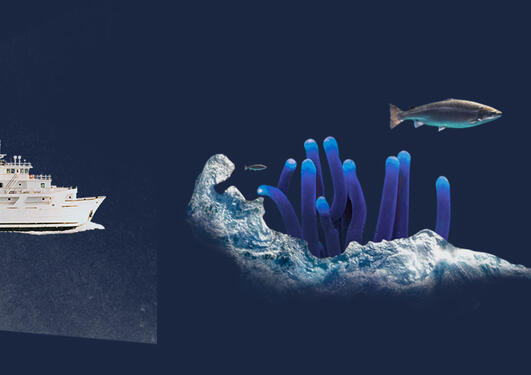Research possibilities for the SEAS postdoctoral research fellow in early human development in coastal Southern Africa
The information on this page is a supplement to the complete advertisement of the position in the recruitment-portal Jobbnorge. The full advertisement of this position in Jobbnorge will be available after august 1, and linked from this webpage. Call deadline is October 31, 2021.
Main content
Position | SEAS postdoctoral research fellow at Centre for Early Sapiens Behaviour |
Research area | Modelling the emergence of innovation, behavioural development and migration in early Homo Sapiens in coastal southern Africa |
Contact | Professor Eystein Jansen |
Mobility | For an incoming candidate |
Unit of employment | Department of Earth Science at University of Bergen |
Thematic area and contact
This position is connected to the theme: Modelling the emergence of innovation, behavioural development and migration in early Homo Sapiens in coastal southern Africa. The position is open to an incoming candidate see mobility rules. The successful candidate will be employed at the Department of Earth Science and included in the SapienCE Centre of Excellence on Early Sapiens Behaviour. Information about the Centre and research possibilities for the fellow is available below. For further details about the research and supervision possibilities please contact Professor Eystein Jansen.
Research possibilities and resources
Research environment in SapienCE: The Centre for Early Sapiens Behaviour (SapienCE) is a Centre of Excellence (CoE) established in 2017, funded by the Norwegian Research Council (https://www.uib.no/en/node/137103/). The centre is built around a team of international scientists specialized in the fields of archaeology, psychology and climatology, led by Professor Christopher Stuart Henshilwood.
Scientific opportunities: SapienCE focuses on the emergence of cultural innovation in Homo sapiens populations of southern Africa between 120,000-50,000 years ago. An inter-disciplinary team of scientists at the University of Bergen and international partners, integrates high-resolution records of early human cultural, social, technological and subsistence behaviours with innovative geoarchaeological, climate and cognitive data models. This holistic approach is providing groundbreaking insight into the diverse aspects of what it means to be human.
Homo populations started acquiring modern anatomical traits by ~300 000 years ago in Africa, but there is no evidence indicating that their behaviour was modern at the time. Current archaeological evidence, although limited, highlights the 120-50 ka interval as a period of accelerated human cognitive, technological and social development. The fundamental causes of this critical transformation remain, however, debated. One often-proposed mechanism is the need to adapt to rapidly changing environmental conditions.
Description of project and motivation
Answering some of the biggest questions in SapienCE – particularly those related to movement, interactions between groups of early humans, their relationship to the marine and terrestrial environment and how these factors influenced cultural development (both technological and symbolic) requires exceptional effort and a truly transdisciplinary approach. One way to tackle the integration and interpretation of data across multiple disciplines is by building up expertise within the centre on ecocultural niche and agent/individual-based modelling informed by, and combined with, archaeological, climatic and social- cognitive information.
Ecocultural niche models (climate niche model = climate envelope model = species distribution model: often used synonymously) are a class of methods that use occurrence data in conjunction with environmental data to build a correlative model of the environmental conditions that meet a species' ecological requirements and predict the relative suitability of habitat. Agent/individual-based modelling, including geographic features, climate change, spatially and temporally varying vegetation, food resources, demography, competition, and cognition, offers an approach to explore the relationship between the emergence of modern human behaviour and environmental factors.
Applying these tools within the SapienCE framework will require linking across the three main themes of the centre: archaeology, climate, and cognition. A focused effort in the form of a dedicated postdoctoral scholar will spark advances on key scientific questions, which include, but are not limited to:
- How did climate variability influence adaptation and migration inside (or out of) Southern Africa on orbital and shorter timescales?
- How did marine productivity change along the coast of South Africa and how did that influence subsistence and settlement patterns? How productive and sustainable were these coastal ecosystems?
- Were there climate gradients/climate migration corridors and/or refugia that could drive coastal versus inland sites and associated occupation/abandonment/ecological niche adaptation?
The selected candidate will be encouraged to further develop and integrate their own their own research interests within the scope of the of project.
Supervision team: Margit Simon (main contact), Norwegian Research Centre: NORCE/SapienCE (paleoclimate/South African climate-human evolutionary linkages), Stefan Sobolowski, NORCE/ SapienCE (regional climate variability & change, climate modelling), Eystein Jansen, Department of Earth Science University of Bergen (UIB)/NORCE/ SapienCE (Earth Sciences /Paleoclimatology), Francesco d´Errico, CNRS/University of Bordeaux, France, Department of Archaeology, History, Cultural Studies and Religion, UIB/ SapienCE (Human Evolution, Anthropology, Eco-cultural niche modelling), William Banks, CNRS/University of Bordeaux, France, (Archaeology/Eco-cultural niche modelling)
International linkages and collaborators: Christoph P. E. Zollikofer, University of Zurich, Switzerland (Individual-based modelling); Axel Timmermann, IBS Center for Climate Physics (ICCP), Pusan National University, Korea, (Paleoclimate and Agent-based modelling), Øyvind Fiksen, Department of Biological Sciences UIB, Bergen Norway (Biological Oceanography, Behavioural Ecology, Marine Ecosystems).
See the full advertisement in Jobbnorge
The full advertisement in Jobbnorge will be available after august 1, 2021. Call deadline is October 31, 2021.
